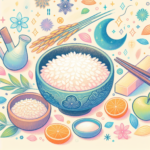The Philosophy of Ingredient Care in Japanese Cooking: A Spiritual Journey Through Food
Japanese cuisine is not just about taste and visual appeal; it is deeply rooted in a philosophy and spirituality that reflects the culture profoundly. The fundamental approach of caring for ingredients is a distinguishing feature of Japanese food culture. This philosophy elevates the act of cooking beyond mere preparation to a level where respect and gratitude for the ingredients take center stage.
The concept of mindfulness towards ingredients is highly valued in Japanese cooking. There is an emphasis on cherishing natural blessings such as fish, vegetables, and rice, and bringing out their flavors and aromas to their fullest potential. A key aspect is the respect for freshness and the seasonality of ingredients. Cooking techniques must also highlight the unique characteristics of each ingredient through delicate methods. This mindset of valuing the essence of the materials aligns closely with Japanese spiritual culture, particularly the principles of Zen and naturalness.
The Importance of Seasonality and Fresh Ingredients
In Japanese cuisine, the connection to the seasons is immensely important. Ingredients used in dishes are at their most delicious and nutritious when harvested during their peak season. For instance, spring brings fresh bamboo shoots and rapeseed flowers to the table, while summer sees an abundance of sweetfish and watermelon. Seasonal ingredients add color to the dining experience and promote an appreciation for what nature provides during different times of the year.
Consequently, creating menus that reflect seasonal ingredients and awareness of nature is vital in Japanese cooking. Understanding when ingredients are in season and using appropriate preparation methods allow for a delivery of flavors at their peak. For example, the autumn delicacy of matsutake mushrooms can be enjoyed best by cooking it gently to retain its aromatic essence.
The Significance of Local Ingredients
Emphasizing local ingredients is another cornerstone of Japanese cuisine. Rice and vegetables grown in local areas benefit from the land’s climate and characteristics. This results in regional specialties that add depth to the flavors of the dishes. The concept of local production for local consumption not only revitalizes regional culinary culture but also reduces the environmental impact.
By using local ingredients, environmental consciousness becomes an integral theme. There is a growing collaboration with local farmers to minimize the use of pesticides and chemical fertilizers, promoting sustainable agricultural practices. Such initiatives help chefs honor their region’s culture while ensuring its preservation for future generations.
The Connection Between Technique and Heart in Cooking
The cooking techniques of Japanese cuisine serve not only as a demonstration of respect for ingredients but also reflect the chef’s heart and spirit. Every aspect—from cutting techniques to the timing of simmering—entails emotions and thoughts poured into each dish. Mastery of these skills goes beyond manual labor; cooking with genuine intent leaves an imprint on the taste of the dish.
Mindful cooking is a practice that shows respect for those who partake in the meal, unveiling the profound emotional strength embedded in the creations. Chefs can express their thoughts and philosophies through food, deepening connections with those who share the table. This emotional bond is a vital element that should be cherished during any dining experience.
The Cultural Importance of Gratitude in Meals
In Japanese food culture, meals are seen as more than just a means of nourishment; they represent special moments. Before eating, it is customary to express gratitude with the phrase “itadakimasu,” which acknowledges the ingredients and the blessings they provide. After the meal, the sentiment continues with “gochisosama deshita,” thanking both the chef and the ingredients, thus fostering a deep-rooted culture of gratitude.
This culture of valuing etiquette explains why Japanese cuisine nurtures not only the palate but also the spirit. Savoring a meal becomes an opportunity to reflect on the stories behind the ingredients and the dedication of those involved in the process, allowing individuals to engage with their own identity and values through food.
Conclusion
The care for ingredients in Japanese cuisine transcends technique and flavor, encompassing a rich philosophical dimension. By honoring seasonal foods, respecting local blessings, and engaging in heartfelt cooking, diners can feel the stories and thoughts hidden behind every dish. It is the hope of many that more people will discover this profound world of culinary art and reevaluate the significance of food in their lives.
Embracing this philosophy invites everyone on a journey to appreciate not just what is on their plate, but the deep connections that food fosters within cultures and individual lives.


